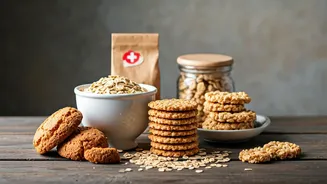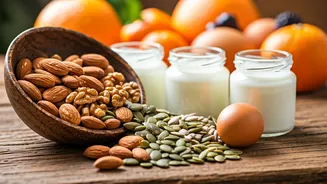Unveiling 6 Weight Gain Myths: Don't Fall Prey, Learn the Truth Behind Healthy Living! Read on to Bust Myths & Achieve Results!
Weight gain. Just the word can send shivers down the spine, right? We're bombarded
with so much information about weight loss, dieting, and fitness that it's easy to get confused. A lot of what we hear is actually plain wrong, old wife’s tales disguised as solid advice.
These myths can sabotage your efforts to maintain a healthy weight and leave you feeling frustrated. So, let's debunk these common misconceptions and set you on the right path to a healthier you. Time to ditch the myths and embrace the facts!
Starving yourself won't help; eat balanced meals for weight loss
This is probably the most common myth, and it's a dangerous one! The idea that starving yourself will help you shed kilos is completely false. When you skip meals, your body goes into "starvation mode." What does this even mean? Well, your metabolism slows down to conserve energy.
So, instead of burning calories, your body clings to them, making it even harder to lose weight. Plus, when you finally do eat, you're likely to overeat because you're so hungry. It's a vicious cycle! Instead of skipping meals, focus on eating regular, balanced meals throughout the day.
This keeps your metabolism humming along nicely, and prevents those unhealthy cravings from taking over. Make sure to include plenty of fruits, vegetables, and whole grains in your diet for sustained energy and to help you feel full and satisfied. So embrace a balanced schedule!
Choose complex carbs over refined ones for a healthy diet
For years, carbs have been demonized as the ultimate weight gain culprit. But the truth is, not all carbs are created equal.
Refined carbs like white bread, pastries, and sugary drinks can contribute to weight gain because they are quickly digested, leading to rapid spikes and crashes in blood sugar. However, complex carbs like whole grains, fruits, and vegetables are actually your friends!
These carbs are digested slowly, providing sustained energy and fiber, which keeps you feeling full for longer. Fiber is especially important because it aids in digestion and helps regulate blood sugar levels. So, don't ditch carbs altogether! Instead, choose complex carbs over refined ones.
Think brown rice instead of white rice, whole wheat bread instead of white bread, and plenty of fresh fruits and vegetables. Listen to your body and it will guide you on the correct path for a healthy lifestyle.
Beware misleading "diet," "sugar-free," "fat-free" labels on foods
Beware of foods labeled "diet," "sugar-free," or "fat-free." These products often contain hidden sugars, artificial sweeteners, and unhealthy fats to compensate for the lack of flavour or texture.
While they might seem like a healthier alternative, they can actually sabotage your weight loss efforts. Artificial sweeteners, for instance, have been linked to increased cravings and weight gain in some studies. Always scrutinize the ingredients list.
Look for hidden sugars like high fructose corn syrup, dextrose, and maltose. And remember that "fat-free" doesn't necessarily mean calorie-free. "Diet" foods are often highly processed and lack the essential nutrients found in whole, unprocessed foods.
Your best bet is to focus on eating real, whole foods instead of relying on these misleading labels.
Cardio + strength training combo key to weight loss, not just cardio
Cardio is definitely important for your overall health, but it's not the only key to weight loss. While long cardio sessions can burn calories, they can also lead to burnout and muscle loss. And let's be honest, who has hours to spend on the treadmill every day?

The real secret to weight loss is a combination of cardio and strength training. Strength training helps you build muscle mass, which increases your metabolism, meaning you burn more calories even when you're resting.
It’s important to find forms of exercise you enjoy so that you want to include it in your life on a regular basis.
Calories matter more than meal timing for weight control
This is a classic myth! It's not when you eat, but what and how much you eat that matters. Calories are calories, regardless of the time of day. If you're consuming more calories than you're burning, you'll gain weight, whether you eat them at 8 AM or 8 PM.
So, if you're hungry in the evening, don't starve yourself. Just make sure you're choosing a healthy snack like a piece of fruit, a handful of nuts, or a small yogurt. Avoid heavy, processed foods right before bed.
The timing of your meals is less important than the overall quality and quantity of your diet over the entire day. Remember, consistency is key! Develop good habits and follow them and do not obsess about timing.
Various factors besides calories affect weight management: metabolism, hormones, genetics, stress
While the "calories in, calories out" equation is definitely a factor in weight management, it's not the whole story. Your metabolism, hormones, genetics, and even stress levels all play a significant role in how your body processes food and stores fat.
For example, stress can lead to increased cortisol levels, which can promote fat storage, especially in the abdominal area. Similarly, hormonal imbalances can affect your appetite and metabolism. It's important to address these underlying issues to effectively manage your weight.
Don’t ignore stress, or lack of sleep. If you find that your physical activity and your diet are on target, it may be wise to get your hormone levels checked out. Seek help from professionals.
AI Generated Content. Glance/InMobi shall have no liability for the content




















